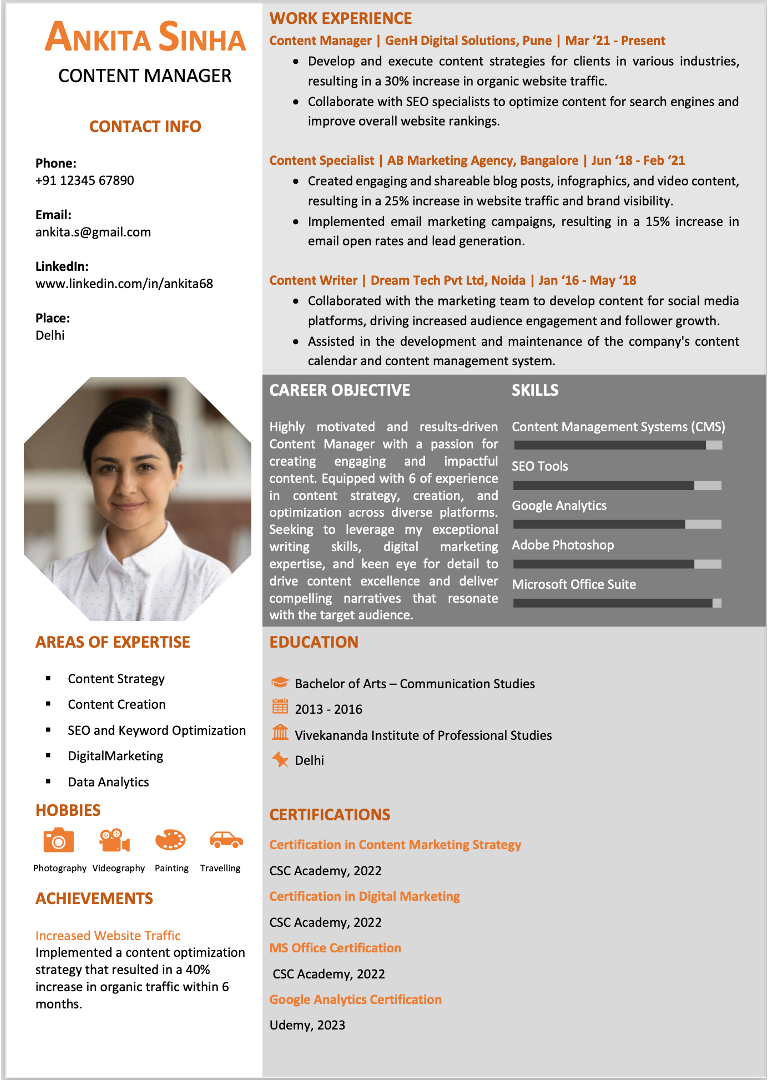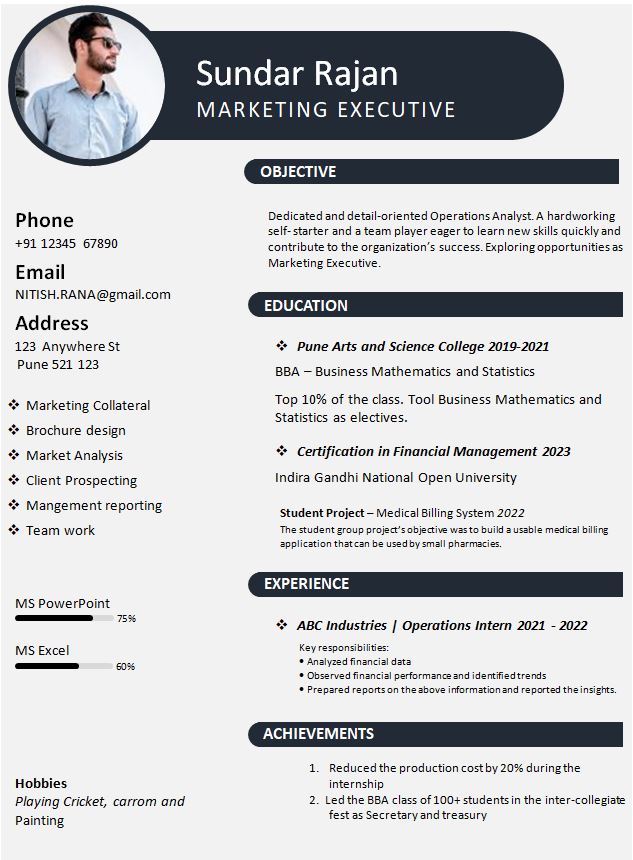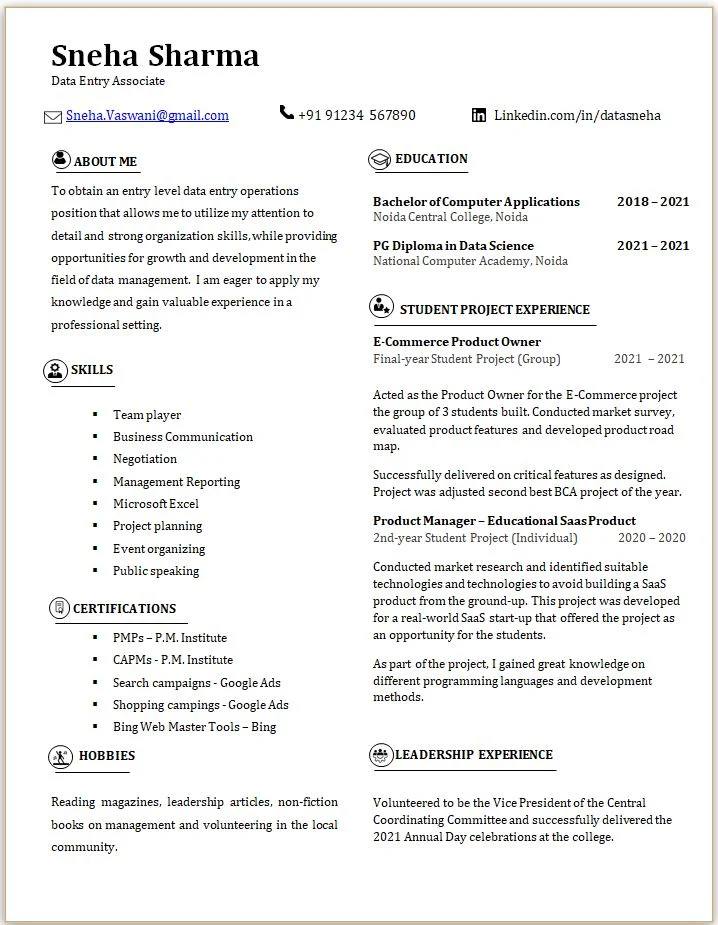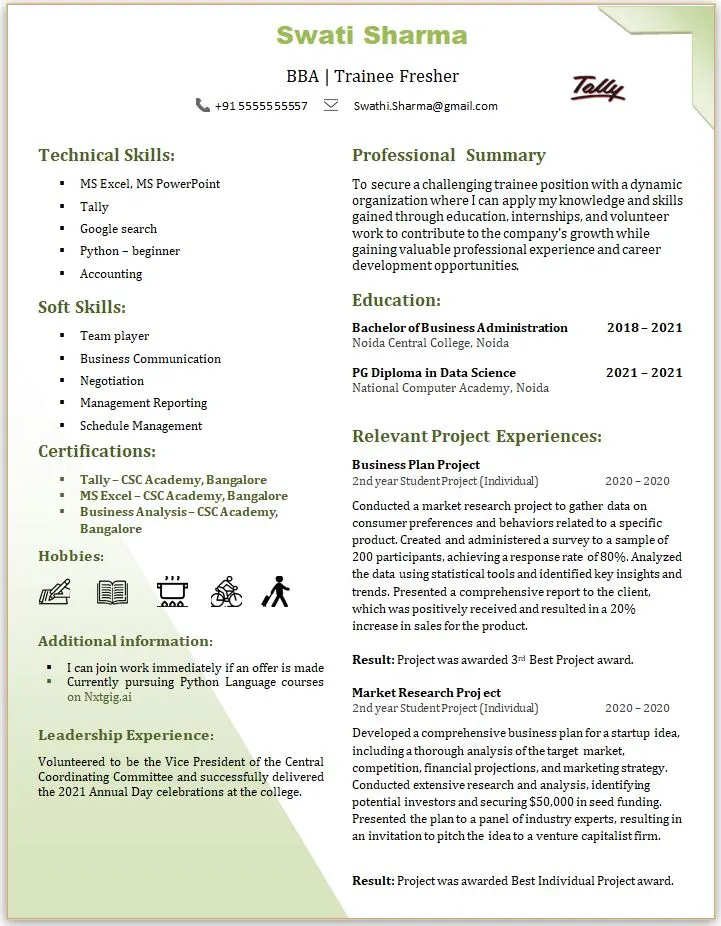Modern Resume
BA Communication Content Writer Resume
Content Writer
ContW


Objective
We left the objective section out to make room for work experiences; but, if you want to add a career objective statement, here is a sample that will go well with this template. "Tech-savvy Content Manager skilled in A/B testing and digital media optimization. Passionate about blending creativity with data-driven insights to elevate user engagement and drive conversions. Seeking to contribute expertise in content strategy and technical acumen to a dynamic team focused on delivering impactful digital experiences."
Education
BA Communication, BCA Bachelor of Computer Applications
Skills
Skills relevant to Content Writer / Content Manager Resumes.
Content Management Systems (CMS):
Content managers and content writers often work with various content management systems to create, edit, and publish content on websites. Including this skill shows that you are familiar with the tools used to manage digital content efficiently. CMS knowledge is essential for maintaining consistent formatting, managing workflows, and ensuring content is delivered to the audience seamlessly.
SEO Tools:
Search Engine Optimization (SEO) is crucial for improving the visibility of online content in search engine results. Content managers and writers who are proficient in using SEO tools can optimize their content for relevant keywords, monitor search rankings, analyze competitors, and enhance the overall search performance of the content.
Google Analytics:
Understanding how content performs is vital. Google Analytics helps track website traffic, user behavior, and engagement metrics. For content managers and writers, having experience with Google Analytics demonstrates your ability to assess content effectiveness, make data-driven decisions, and refine strategies to reach target audiences more effectively.
Adobe Photoshop:
While not a primary skill, having basic graphic design skills can be valuable for content managers and writers. You might need to create or edit images for articles, social media posts, or website banners. Being able to make minor edits or create simple visuals can save time and improve the visual appeal of your content.
Microsoft Office Suite:
Content managers and writers often need to create and edit documents, spreadsheets, and presentations. Proficiency in Microsoft Office tools (such as Word, Excel, and PowerPoint) is essential for drafting content, collaborating with teams, and creating compelling materials. These skills collectively showcase your ability to create, manage, and optimize content effectively, both in terms of quality and visibility.
Don't forget to tailor your resume to highlight the skills most relevant to the EACH job you're applying for. The keyword is EACH. Do not re-use the same resume for multiple job applications.
Projects
Digital Media Project Ideas for Students.
Engaging in relevant projects during your time in college can greatly enhance your chances of standing out to potential employers in the digital media industry. Here are some project ideas that can showcase your skills and passion:
Personal Blog or Website:
Start a blog or website where you regularly publish content related to digital media, technology, or your specific area of interest within the industry. This demonstrates your writing skills, content creation abilities, and your understanding of SEO and online presence.
Social Media Campaign:
Plan and execute a social media campaign for a local event, a club you're a part of, or a cause you're passionate about. Showcase your ability to strategize, create engaging content, and manage social media platforms effectively.
Content Creation Portfolio:
Build a portfolio of different types of content, such as articles, blog posts, infographics, videos, or podcasts. This demonstrates your versatility as a content creator.
SEO Audit and Optimization:
Choose a website, perhaps a small local business, and perform an SEO audit. Identify areas for improvement and implement optimization strategies. Document the process and results.
Podcast or YouTube Channel:
Create a podcast series or a YouTube channel discussing topics related to digital
media, technology trends, or industry insights. This showcases your public speaking, content creation, and multimedia skills.
Digital Marketing Campaign:
Develop and execute a digital marketing campaign for a real or hypothetical product or service. This could include creating ad copy, graphics, managing social media ads, and analyzing the results.
Ebook or Whitepaper:
Research and create an in-depth ebook or whitepaper on a relevant topic within digital media. This demonstrates your research and content creation skills and positions you as a thought leader.
Web Design or Redesign:
Design a website for a student organization, local business, or yourself. Showcase your web design skills and your understanding of user experience and visual aesthetics.
Community Engagement Project:
Collaborate with a local nonprofit organization to help them improve their online presence. This could involve creating content, managing their social media, or revamping their website.
Data Analysis and Visualization:
Analyze data related to a digital media trend or social media engagement. Create visualizations to present your findings and insights.
Case Study:
Choose a successful digital media campaign, product launch, or rebranding effort and create a detailed case study. Analyze the strategy, implementation, and results.
Mobile App Concept:
Develop a concept for a mobile app related to digital media, content creation, or social engagement. Create wireframes and mockups to showcase your design thinking.
The goal of these projects is not only to showcase your skills but also to demonstrate your passion, creativity, and ability to bring value to potential employers in the digital media industry. When working on projects, try to choose topics that genuinely interest you, as your enthusiasm will shine through in your work.
Interests/Hobbies
If you are a Content Manager or a Content Writer, you can consider adding any of these hobbies and interests to your resume.
When adding hobbies to a resume, it's a good idea to choose ones that complement the skills and attributes relevant to the position you're applying for.
Blogging or Writing:
If you maintain a personal blog or enjoy writing creatively in your free time, it demonstrates your passion for writing and your commitment to the craft. It also showcases your ability to consistently produce content.
Reading fiction / Non fiction:
Mentioning that you enjoy reading, especially about topics related to your field or industry, highlights your dedication to staying informed and your interest in improving your writing skills.
Digital Marketing Exploration:
If you explore and experiment with digital marketing techniques in your free time, such as creating and managing social media accounts, it indicates your hands-on experience and interest in digital platforms.
Graphic Design:
If you dabble in graphic design as a hobby, it can be beneficial for roles that occasionally require creating simple graphics or visuals to accompany written content.
Photography:
Photography can be relevant if you're involved in visually-driven content creation or if you're responsible for sourcing images for articles or social media.
Social Media Management:
If you manage personal social media accounts or even a hobby-related page, it highlights your familiarity with social media platforms and their dynamics.
Language Learning:
If you're learning a new language, it can be beneficial if the company has an international audience or if you're interested in working with diverse markets.
Public Speaking or Toastmasters:
If you're part of a public speaking club like Toastmasters, it showcases your communication skills and ability to present ideas effectively.
Creative Writing or Fiction:
Mentioning creative writing or fiction writing as a hobby can show your versatility and creativity beyond content creation for business purposes.
Community Involvement:
Engaging in community projects or volunteering, especially if it's related to content creation, can demonstrate your dedication to meaningful communication and engagement.
Experience
Content Manager | GenH Digital Solutions, Pune | Mar ‘21 - Present
• Develop and execute content strategies for clients in various industries, resulting in a 30% increase in organic website traffic.
• Collaborate with SEO specialists to optimize content for search engines and improve overall website rankings.
Content Specialist | AB Marketing Agency, Bangalore | Jun ‘18 - Feb ‘21
• Created engaging and shareable blog posts, infographics, and video content, resulting in a 25% increase in website traffic and brand visibility.
• Implemented email marketing campaigns, resulting in a 15% increase in email open rates and lead generation.
Content Writer | Dream Tech Pvt Ltd, Noida | Jan ‘16 - May ‘18
• Collaborated with the marketing team to develop content for social media platforms, driving increased audience engagement and follower growth.
• Assisted in the development and maintenance of the company's content calendar and content management system.
Additional Inputs
Exploring the content management profession while you're still in college is a great way to gain insights and decide if it's the right career path for you. Here are some steps you can take to learn more about content management as a profession:
Research the Role: Start by researching what a content manager does. Look up job descriptions, responsibilities, and skills required for content management positions. Understand how content management fits into the broader digital media landscape.
Take Relevant Courses: If your college offers courses in digital media, content creation, SEO, social media management, or marketing, consider enrolling in them. These courses will provide you with a solid foundation for content management.
Internships: Seek out internships or part-time positions related to content creation, social media management, or digital marketing. Practical experience is invaluable in understanding the day-to-day tasks and challenges of content managers.
Start a Blog: Launching your own blog is a practical way to understand content creation and management. You can experiment with writing different types of content, optimizing for SEO, and using content management systems.
Online Learning Platforms: Utilize online learning platforms like Coursera, Udemy, or LinkedIn Learning. They offer courses on content creation, SEO, content strategy, and more. These courses can help you build relevant skills.
Network: Attend digital marketing, content creation, and media-related events on your campus or in your local area. Networking can help you connect with professionals in the field and gain insights.
Join Clubs or Organizations: Join clubs or student organizations related to digital media, writing, marketing, or communication. These groups often organize workshops, guest speakers, and events that can provide valuable information.
Follow Industry Experts: Follow content managers, digital marketers, and media professionals on social media platforms. Engage with their content to learn about industry trends, tips, and insights.
Read Industry Blogs and Books: Stay updated by reading blogs, articles, and books related to content management, digital media, and marketing. This will deepen your understanding of the field.
Create a Portfolio: As you gain experience, start building a portfolio showcasing your content management and writing skills. Include your blog, samples of articles, and any projects you've worked on.
Attend Workshops and Webinars: Many organizations offer free or low-cost workshops and webinars on topics relevant to content management. These can help you learn from experts and stay up-to-date.
Experiment and Learn: Be open to experimenting with different content formats, platforms, and techniques. Learning through trial and error can be incredibly valuable.


